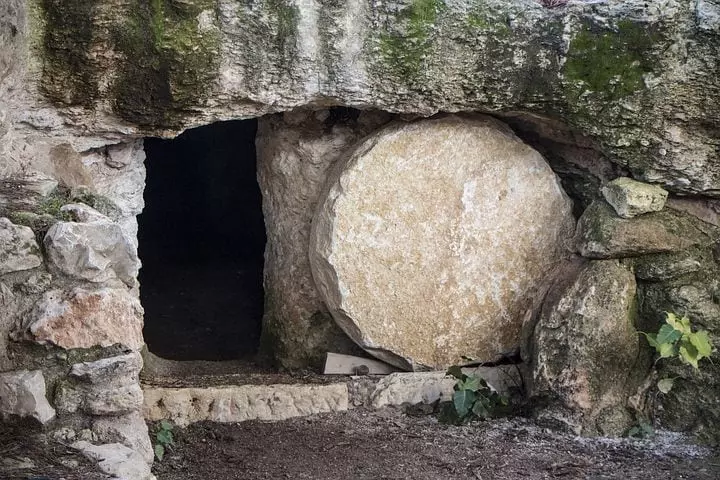Some Christians today deny that many of the miraculous stories recorded in the Old Testament were literal, historical events. They believe that an allegorical interpretation doesn’t negatively impact the truth of miraculous New Testament events at all. In fact, they believe that it makes the Bible as a whole, and thus Christianity, much easier for an intelligent individual to accept.
Is this true? The answer, I believe, is illustrated in a question posed by an individual describing himself as “a non religious theist” to renowned Christian philosopher William Lane Craig, of Reasonable Faith.
The questioner states that numerous fantastical OT events (creation of the world and man, Noah’s ark and flood, etc) prevent him from accepting Christianity. Jon writes:
“These accounts incorporate very specific language and do not seem to lend themselves to figurative interpretation…if I concede that the book of Genesis as a whole (or a significant portion thereof) is not true, then that leaves me with the awkward fact that Jesus Christ- the deity to whom I would owe my allegiance- on more than one occasion affirmed these errors as truths… The only way it seems to me one can resolve this problem is by saying Christ affirmed these truths in a ‘metaphorical sense,’ but I find this justification unsatisfying, mainly because the reasonable interpretation of Jesus’ words is that he really did believe these events were literally true. If you say that the gospel writers misquoted Jesus on all of these counts, then that raises the question of what else they may have got wrong. Needless to say, that strikes right at the heart of the Bible as a whole.”
In response, Craig, a giant on the front lines of Christian apologetics opens by stating:
“When people ask me what unanswered questions I still have, I tell them, ‘I don’t know what to do with these Old Testament stories about Noah and the ark, the Tower of Babel, and so on,’ So I find myself in the same boat as you, Jon.” Despite this admission, he boldly claims that the “central truths of a Christian worldview” do not “stand or fall with such questions.”
While not explicitly advocating the view that troublesome OT accounts shouldn’t be interpreted literally, Craig offers the following “Christological implications”:
“Your claim is that since Jesus evidently believed in the historicity of these stories, then if we allow that these narratives are not historical, we allow that Christ has erred. […] Now that’s a really good question that theologians need to explore! Did Jesus hold false beliefs in his human consciousness? […] Did God stoop so low in condescending to become a man that he took on such cognitive limitations that Jesus shared false beliefs typically held by other ordinary first century Jews? Since I have good reason to believe in his deity…I would sooner admit that Jesus could hold false beliefs (that ultimately don’t matter) rather than deny his divinity.”
Craig suggests that the idea of an apparently fallible, non-omniscient Jesus, possibly deluded in His understanding of OT history, yet an unquestionable authority on all things New Testament including prophetic insight, is an option worthy of exploration.
Craig’s easy to overlook parenthetical assertion that the historicity of these OT events “ultimately don’t matter” may be attributable to his second argument, which is that Jesus’s assertions in Luke 17:26-27 (regarding Noah and the flood) and Matthew 12:39-41 (regarding Jonah and the fish) are “compatible with citing a story to make one’s point.” As corroboration, Craig ineffectively uses the following examples:
- “… Jude 9 mentions an incident in The Assumption of Moses, an apocryphal work which was never part of the Jewish canon of Scripture. 1 Timothy 3:8 makes a comparison to a couple of characters named in Jewish targums, Dead Sea scrolls, and rabbinic traditions, which were similarly never part of the Jewish canon. Such comparisons do not commit the authors to the historicity of the characters or events.”
Craig’s conclusion that the citation of information from extra-biblical sources within the canon of Scripture doesn’t ascribe historicity to the characters or events is faulty logic. The more rational assumption would be that nuggets of truth, as well as actual historical people and events can be found in sources that are not wholly reliable or divinely inspired. The portions cited in the canon are true, the remainder of the information in these works may not be.
- “We may have something similar in Romans 5.7, where Paul says, ‘Indeed, rarely will anyone die for a righteous person- though perhaps for a good person someone might actually dare to die.’ Simon Gathercole, a fine New Testament scholar, points out that Paul is appealing to a common motif in Greco-Roman culture of someone’s stepping forward to die in the place of another. The most famous example in antiquity was Alcestis in Euripides’ play by that name, who volunteered to die in the place of her husband King Admetus. Alcestis was celebrated for centuries, and her name is to be found even in epitaphs on Christian graves. Gathercole thinks that in Romans 5.7 Paul may actually be thinking of Alcestis. He says, in effect, ‘Alcestis was willing to die for her beloved husband, but Christ died for his enemies.’ So saying would not commit Paul to the historicity of this purely literary figure.”
This argument is certainly not up to Craig’s usual standards. First, it is complete speculation as to whether or not Paul was referencing this play. Second, even if he had this reference in mind, he did not literally use the statement, “Alcestis was willing to die for her beloved husband, but Christ died for his enemies,” which is what would be necessary for this comparison to apply.
Dr. Terry Mortenson highlights the practical implications of the theory that Jesus used fictional stories to impart knowledge and assurance of literally occurring events in the impending future:
“No one would believe in the Second Coming of Christ if the promise of it (as recorded in Matthew 24:37-39) was given as, ‘Just as Santa Claus comes from the North Pole in his sleigh pulled by reindeer on Christmas Eve and puts presents for the whole family under the Christmas tree in each home, so Jesus is coming again as the Kings of kings and the Lord of lords.’ In fact, the analogy would convince people that the Second Coming is a myth.”

Craig posits, “It wouldn’t follow from the non-historicity of certain Old Testament narratives that God’s ‘repository for truth is in effect fundamentally tainted and therefore can’t be trusted.’” Yet, that is exactly what logically follows if extraordinary OT events, which Jesus, the apostles, and other authors of the Bible refer to as literal are not, in fact, historical.
Jon reveals the heart of the conundrum when he asks what reference he is left with to discern what aspects of his faith are true:
“Am I to be left with only the voice of conscience? If so, this does not seem to be a position too different than the one I am in now.”
Craig’s answer is a non-answer:
“The great literature of the world shows us that works which are non-historical, like the plays of Shakespeare or the novels of Dostoyevsky or the fables of Aesop, have important truths to teach us. […] Just use good principles of biblical interpretation and follow the evidence where it leads, while retaining an attitude of humility.”
The Bible is not simply a piece of “great literature” from which we can glean “important truths” amid fantastical tales. Proverbs 3:5 instructs us not to “lean on our own understanding,” which is exactly what one is left to do if the historicity of OT events depend on what seems plausible by today’s standards.
Conclusion
In an effort to win skeptics to Christianity, make the Bible more palatable, and avoid the ridicule of those equating the Bible with a book of fables, Craig has offered explanations which compromise Scripture to conform to more realistic expectations. The result is the illogical assertion that allegorizing OT events in no way hinders the equally extraordinary events of the NT such as the virgin birth, miracles that Christ performed, or His death and resurrection. The inescapable truth is that if large swathes of the OT are indeed allegory, it is impossible to distinguish where the allegory ends and the literal history begins. The damage to Bible history is extensive and it undermines the words of Jesus, the apostles, and the gospel.









How sad many in academia abandon the historicity of Scripture. Frankly, I think it is the sin of pride to be accepted by their peers. Some think that we who believe the Scripture are actually a detriment to the gospel. Not so, repentance (I’m a sinner against a holy God) towards God and faith in Jesus Christ is salvation, not an intellectual assent.
I completely agree Susan. I just read another response from William Lane Craig this morning to a questioner who was asking him to clarify his position on the historicity of Adam. While he doesn’t deny that Adam was a literal person, he says that he is just now engaging in serious research on that topic. So, he declined to give an official opinion. However, he did make clear that he found the YEC position untenable due to “science.” I could not help but wonder what prevents him from even considering the scientific evidence for the historicity of Genesis provided by so many brilliant scientists across all fields of science who are YEC’s.
William Lane Craig has done much to defend the Christian faith. I studied apologetics under him while a student at Trinity Evangelical Divinity School. But the final authoritative source for our faith is the Bible, not well known apologists or even the well intentioned (but lately often mistaken) pope.
Craig has built a name for himself from his defense of the faith based on the Kalam Cosmological argument for the existence of God. Craig applies the first statement (Everything that begins to exist has a cause) to the universe, then attempts to prove the universe began to exist using the Big Bang theory, which requires the universe to have a beginning.
Well as soon as you’re into defending the Big Bang, you’re into defending billions of years for the age of the earth. So it should come as no surprise to anyone that Craig has a hard time defending a literal reading of Genesis – which requires you to understand the entire universe was created in 6 days – and other such historical acts of God that are consistent with a young earth, but inconsistent with an old/ancient earth and universe.
I have made the point previously that you shouldn’t defend the truth of the bible using lies. Who would believe the resurrection of Jesus if your proof of the resurrection is the Easter Bunny? Likewise as the Big Bang is fiction according to Genesis, we should not use it to defend the faith. Which puts a big crimp in Craig’s apologetic approach.
But truth is truth, In my humble opinion better to Enrage the Dragon (by which I mean enrage Satan and other deniers of Biblical truth) than to deny the truth of God’s word.
It really comes down to who are you going to believe? And as Joshua put it: “…choose for yourselves this day whom you will serve, whether the gods your forefathers served beyond the River, or the gods of the Amorites, in whose land you are living. But as for me and my household, we will serve the LORD.” (Josh 24.15) I’m with Joshua, I’m going to follow the Lord, not the gods of this age and their acolytes who deny God’s clear teaching on how he created the universe, and mankind. Following the truth of God may not win you popularity contests, but when you stand before God, you’ll have a much better chance of hearing “Well done, good and faithful servant” (Matt 25.21) than if you spend your life denying much of what God has done and taught.
Amen Duane!